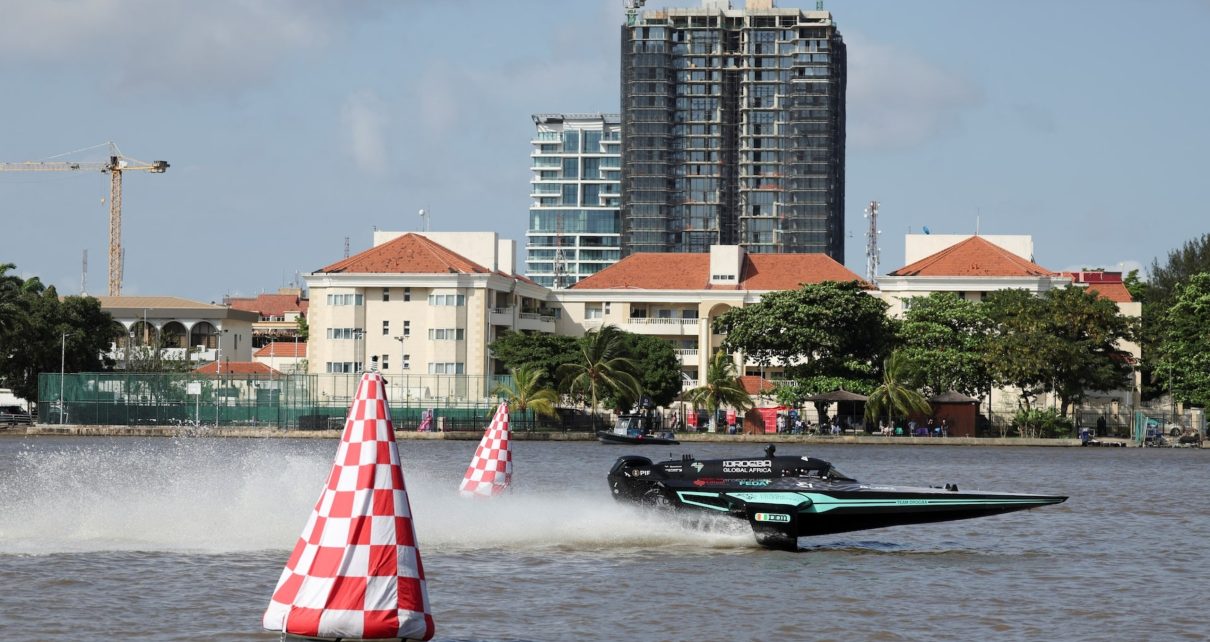After the electric waves settle, what does the E1 Powerboat Championship reveal about Africa’s most restless city?
By Nkanu Egbe, Editor, Lagos Metropolitan
At nine on that Saturday morning, the lagoon looked like glass. Vendors along Marina adjusted trays of chilled water sachets and puff-puff. Then, almost without warning, two silver-blue crafts lifted on hydrofoils and sliced across the water — not roaring but whispering. The crowd gasped, phones rose, and for a heartbeat, Lagos stood still.
For the first time, Africa hosted the E1 World Championship — the all-electric powerboat series that has raced in Monaco, Venice, and Jeddah. The E1 Lagos Grand Prix was no ordinary event. It was Lagos daring to re-introduce itself to the world.
A City on the Global Map
Governor Babajide Sanwo-Olu called it “a milestone for clean energy, innovation, and youth.” Despite a tropical downpour that delayed the start, spectators poured back when the skies cleared. When Team Brazil, piloted by Timmy Hansen and Ieva Millere-Hagin, took victory, the roar that followed wasn’t just for a race — it was for recognition.
“This is Lagos telling the world we can host anything,” said Tade Adekunle, a marketing executive filming from CMS Jetty. “I’ve never seen people this excited about the lagoon.”
For once, international headlines paired “Lagos” with “technology” and “sustainability.” Drone footage of raceboats skimming past the skyline went viral — proof that the city, long defined by traffic and chaos, could deliver spectacle and order in the same frame.
THEMES Plus in Motion
The championship aligned neatly with Lagos’s development blueprint, T.H.E.M.E.S Plus:
Traffic & Transportation, Health & Environment, Education & Technology, Making Lagos a 21st-Century Economy, Entertainment & Tourism, Security & Governance — with the “Plus” standing for youth and social inclusion.
On race week, the policy leapt from paper to water:
- Clean Mobility: zero-emission boats showcased electric propulsion.
- Tourism: hotels across Victoria Island were near capacity.
- Innovation: local engineers handled telemetry and charging logistics.
“If we can race electric boats, we can commute electric ferries,” said Dr. Damilola Olajide of the Lagos State Waterways Authority, hinting at the state’s plan to deploy 70 electric ferries by the end of 2025.
Waterfronts Become Front Rows
The race turned Marina, Tarkwa Bay, and Eko Atlantic into amphitheatres. Influencers, families, and fishermen shared the same skyline. For once, Lagosians looked outward rather than inward.
On a ferry deck, David, a deckhand, grinned as the hydrofoils hissed past.
“If these boats can run without smoke, maybe our ferries will too.”
Still, the contrasts were visible: the storm that flooded access roads, the VIP enclosures that edged out the ordinary crowd, and across the lagoon, Makoko’s wooden stilts — a mirror reminding Lagos that progress must include everyone.
Branding a 21st-Century City
Hosting E1 was less about speed and more about image. It reframed Lagos as a testing ground for clean technology, a destination for entertainment, and a metaphor for African modernity.
But branding without access is fragile. The true legacy will be measured not in media clips but in whether Marina’s waterfront remains open, shaded, and safe; whether families can stroll there at dusk long after the race has gone.
From Spectacle to System
To make the day matter beyond hashtags, Lagos must move from event to ecosystem:
- Institutionalise an annual Lagos Marine Innovation and Culture Festival combining tech, music, and local boat regattas.
- Electrify mobility — deliver the promised ferries with schedules and integrated ticketing.
- Design for resilience — strengthen jetties, drainage, and flood defences.
- Tell new stories — support filmmakers and students exploring Lagos’s blue economy.
- Include everyone — vendors, artisans, and shoreline residents must share both the view and the value.
When the Waves Settled
As the last RaceBird was craned from the water, applause rippled across Marina. A boy shouted, “Lagos don win!” — not a trophy, but a moment of belonging.
By evening, the vendors had packed up, the lagoon shimmered under city lights, and the air smelled of wet earth and roasted corn. The world had watched Lagos — and, for a fleeting day, Lagos saw itself differently: not as a city struggling to catch up, but as one already sailing into its own future.


